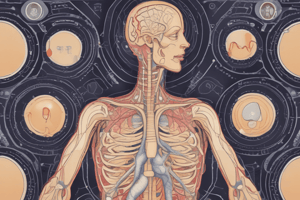Podcast
Questions and Answers
What is the primary function of the endocrine system?
What is the primary function of the endocrine system?
To secrete hormones into the bloodstream that travel to target tissues.
Which type of hormone can stimulate only cells with specific receptors?
Which type of hormone can stimulate only cells with specific receptors?
- No hormones
- Lipid-soluble hormones
- Both types of hormones (correct)
- Water-soluble hormones
Water-soluble hormones can easily pass through the cell membrane.
Water-soluble hormones can easily pass through the cell membrane.
False (B)
Match the following classes of chemical messengers with their definitions:
Match the following classes of chemical messengers with their definitions:
What regulates hormone levels in the blood?
What regulates hormone levels in the blood?
The two regions of the pituitary gland are the ______ and ______.
The two regions of the pituitary gland are the ______ and ______.
What is a receptor site?
What is a receptor site?
Flashcards are hidden until you start studying
Study Notes
Endocrine System
- The endocrine system is comprised of glands and specialized cells that secrete hormones into the bloodstream
- Hormones are chemical messengers that travel through the blood to target tissues
- Target tissues have receptors that bind to specific hormones, triggering responses
Endocrine System Glands
- The endocrine system contains several glands, including the pituitary, thyroid, parathyroid, adrenal, pancreas, and gonads
Types of Chemical Messengers
- Autocrine messengers act on the same cell they are released from
- Paracrine messengers act on nearby cells of a different type
- Neurotransmitters are released by nerve cells
- Hormones are released into the blood and travel to target tissues
Hormone Types
- Water-soluble hormones include proteins, peptides, and amino acids
- Lipid-soluble hormones include steroids and eicosanoids
- Examples of water-soluble hormones include growth hormone, antidiuretic hormone, and prolactin
- Examples of lipid-soluble hormones include luteinizing hormone and androgens
Hormone Receptors and Mechanisms of Action
- Hormones only bind to cells that have the specific receptor for that hormone
- Receptor sites are specific, allowing only one type of hormone to bind
- The specificity is due to the molecular shape and chemical characteristics of the hormone and receptor
Target Tissue Specificity and Response
- Different target tissues respond differently to the same hormone, even though they may have the same receptor
- The response depends on the type of receptor and the intracellular pathways activated by the hormone
Regulation of Hormone Levels in the Blood
- Negative feedback is the primary mechanism for regulating hormone levels
- Negative feedback involves a stimulus triggering the release of a hormone, which then inhibits further release of the hormone once levels reach a certain point
- Positive feedback is less common, but it involves a stimulus triggering the release of a hormone, which further promotes the release of the hormone
Terms
- Gland: An organ that secretes hormones
- Hormones: Chemical messengers secreted by glands that travel through the bloodstream to target tissues
Pituitary Gland
- The pituitary gland is located in the brain and is controlled by the hypothalamus
- It is divided into two regions: the anterior pituitary and the posterior pituitary
Studying That Suits You
Use AI to generate personalized quizzes and flashcards to suit your learning preferences.




